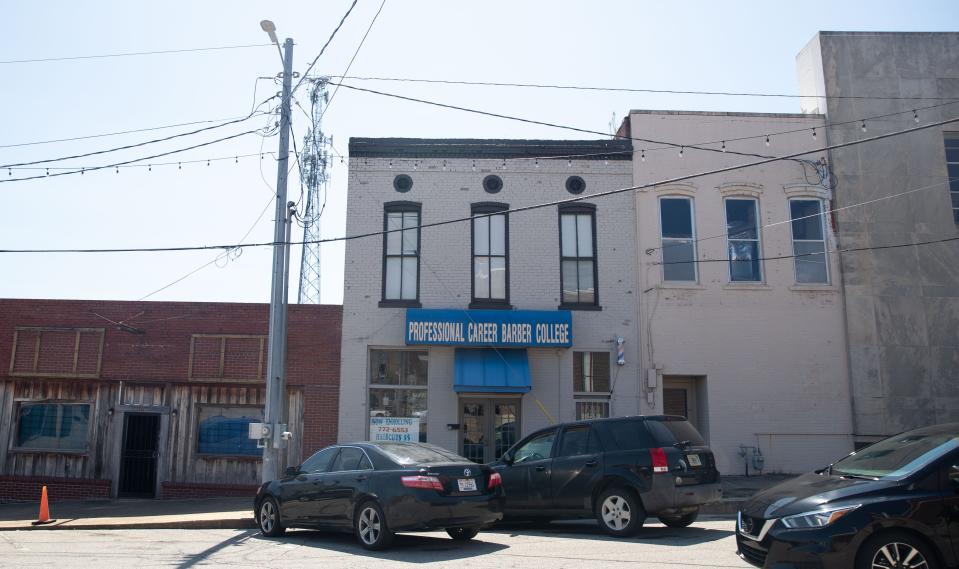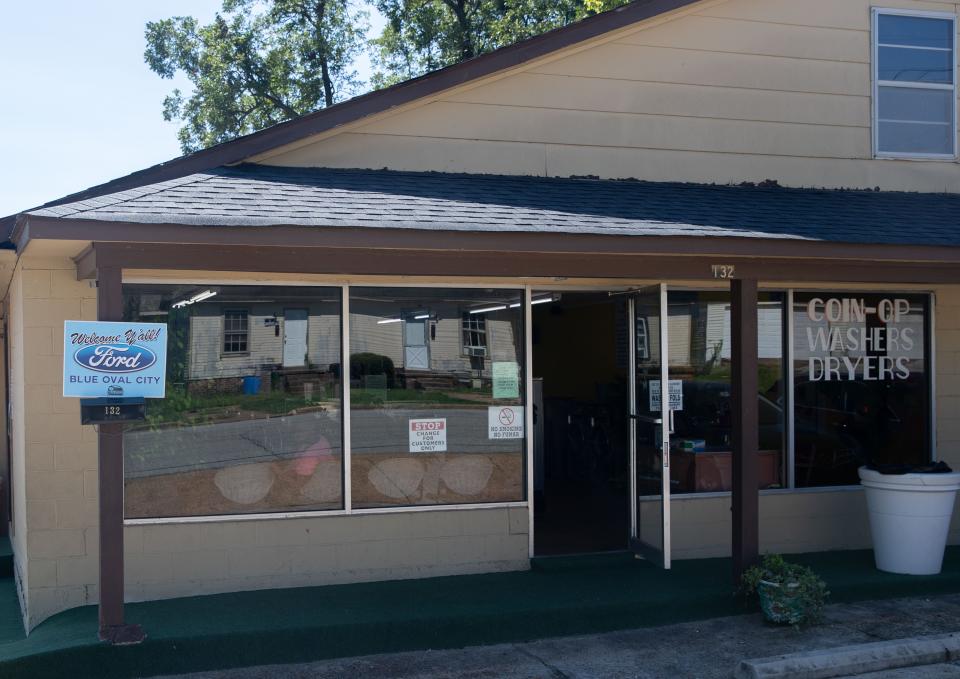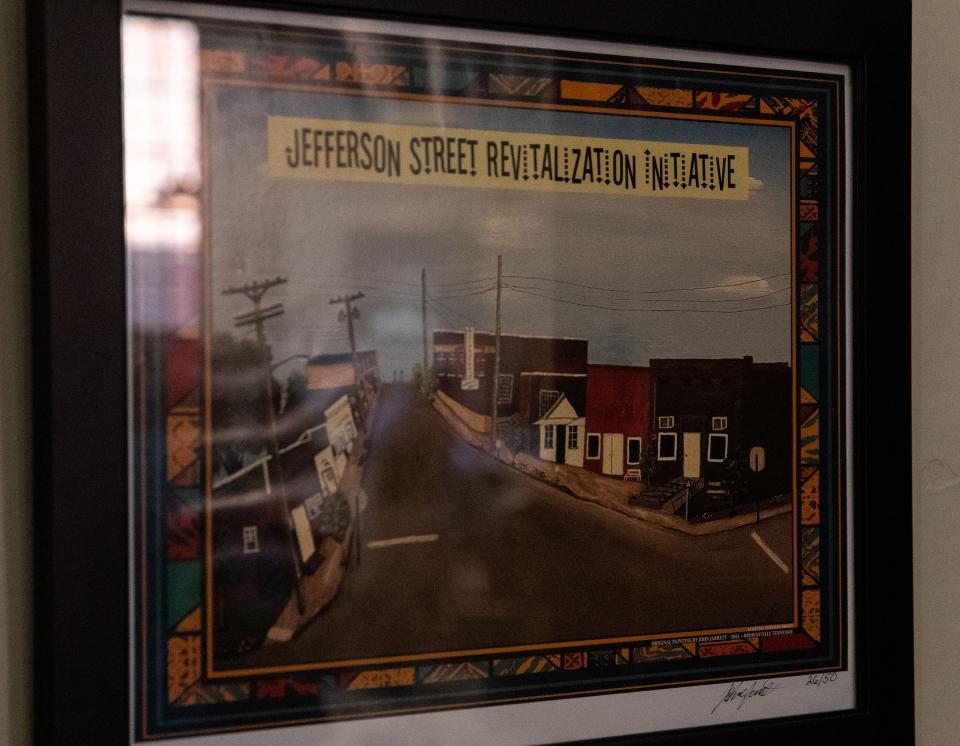'Black Wall Street': The history of Brownsville's Jefferson St. and the push to preserve it
When lifelong Brownsville resident Jean Carney decided to open a laundromat more than two decades ago, she knew exactly where to open it.
Family Coin-Op Laundry — Brownsville’s only laundromat — is in the Jefferson Street Historic Commercial District, an area known in the 1950s and 1960s for being Brownsville’s version of “Black Wall Street.”
Carney’s business — located at 132 E. Jefferson St. since 2001 — is at the same spot where Brownsville civil rights activist Odell Sanders ran his laundromat during the street's “Black Wall Street” period.
“When the opportunity availed itself, I took every penny that I had in my 401(k) to bring it back to where it is now,” Carney said. “When I leave here, I want that business to be there. I want to leave that legacy because of the blood, sweat and tears that Mr. Odell Sanders put into bringing a laundry business into our community on Jefferson Street.”
Brownsville development:Brownsville needed an economic 'shot in the arm.' Has Ford's BlueOval City delivered that?
Ford in Tennessee:Ford's BlueOval City: 3 key things to watch as $5.6 billion project progresses
Due to segregation and restrictions placed on where Black Brownsville residents could shop within the city, Jefferson Street became an economic hub during the 1950s and 1960s. Jefferson Street featured many Black-owned businesses along the street with churches and a school. It was also where the city's Black residents lived, including the most prominent business owners and educators.
In addition to owning one of the few businesses remaining on Jefferson Street, Carney, 79, also serves on a committee that in recent months is trying to figure out how to properly preserve the area’s history and importance to Brownsville for generations to come.
“I’ve had a chance to sit in on one of their meetings to listen to what their plans are and what the goals are,” said Monique Merriweather, the new Brownsville/Haywood County Chamber executive director. “I think it’s great. There’s a lot of great history on Jefferson Street, and to rebirth that and bring it back, I think is just a plus for the community.”

Brownsville’s 'Black Wall Street'
Carney was born in 1943. Her grandfather purchased land on Jefferson Street in 1944, and she’s called Brownsville home since.
The Jefferson Street Commercial Historic District is bounded by South Washington Avenue on the west, U.S. 70 on the north, Margin Street on the south and North Church Avenue on the east with Jefferson Street as the district's anchor.
Carney lived so closed to then-Carver High School on Jefferson Street that her family could hear the first school bell, which meant it was five minutes to 8 a.m. when school started. Carney and other school children would cut through their neighbors’ backyards and be sitting inside the school gym by the time the second school bell rang exactly at 8 a.m. each day.
The main reason for Jefferson Street becoming a Black economic hub during this time period was because Black people could not access the white areas and businesses in Brownsville with no restrictions. Carney said Black residents in Brownsville were required to be off the streets by 10 p.m. and she remembers seeing police officers standing at the Haywood County Courthouse to enforce the curfew.

Sanders later closed his laundromat due to the abuse he and his family suffered during this time period. That included his house being bombed, his wife being run off the road one night (she survived) and his children often being bullied and ostracized at school, Carney said.
Carney also remembered the happier moments during her teenage years on Jefferson Street as she recently gave a Commercial Appeal reporter a tour of the area. Jefferson Street was once filled with community grocery stores, a juke joint, doughnut shop and flower shop, among other businesses and Sanders’ laundromat.
“It’s a part of me,” she said about Jefferson Street. “It’s part of my all being. Not only did I just grow up on Jefferson Street in that area, all my teachers lived there and the administrators. All of the Black professionals lived there. That was home for all of us.”
Ford's BlueOval City:Inside look: How Ford's $5.6 billion BlueOval City project has taken shape over past year
Ford in Tennessee:A year after Ford's BlueOval City announcement, here are 5 things to know about the project
Brownsville’s Jefferson Street in 2022 and beyond
As Brownsville desegregated in the 1960s and later, Jefferson Street’s significance diminished as Black residents were able to patronize white-owned businesses they previously weren’t able to. The area now is more of a reminder of what it once was versus what it could be in the future.
“Right now, I look at it and see the older homes that are gone, teachers that are deceased, administrators that are deceased, stores that are gone,” Carney said.
During Brownsville’s “Black Wall Street” period, the town had an estimated population of 5,000. Brownsville in 2022 is a majority-Black city in rural Haywood County with a population of about 9,700, and more 67% of the population is Black, according to U.S. Census Bureau data.
While many of the properties on Jefferson Street are still Black-owned there are only a handful of businesses like Family Coin-Op Laundry and more recent additions such as the Farmer’s Market added to the area by the city’s first Black elected mayor, Bill Rawls.
Rawls’ family owns Rawls Funeral Home, also located on Jefferson Street. As the city is set to transform due to being near Ford’s $5.6 billion BlueOval City project in Stanton, he’s made it a priority to keep the city’s heritage intact.

“We’re trying to find funding to do aesthetics and bring businesses back to that African American district,” Rawls said. “That’s part of as we grow and change keeping part of our heritage. (The) Jefferson Street revitalization project foundation is part of maintaining our heritage.”
While Carney hopes Jefferson Street's history is preserved, she's already noticed how Brownsville has changed in the past year with BlueOval City on the horizon.
"At first, it didn’t make a difference," Carney said. "Now that the seed has been planted and they’re beginning to water that seed and you can see the seed sprouting a little bit. It’s a different story in the sense that you’re seeing people here that you’ve never seen before. The diversity of the population is changing before your very eye. Construction is changing before your eye."
Carney said the newly formed committee is in the middle of trying to form a nonprofit but has not officially gotten approval. Once the nonprofit is formed, they will work to find specific solutions to preserving Jefferson Street.
“The general goal is to write the history of Jefferson Street,” Carney said.
In the meantime, Family Coin-Op Laundry remains in a strong position to take advantage of being the only laundromat in town and seemingly gaining new customers each day since the Ford announcement.
“Location is everything when you’re speaking of business,” she said. “If you’ve been running a business at that location since the '50s, customers automatically know where to come.”
Omer Yusuf covers the Ford project in Haywood County, residential real estate, tourism and banking for The Commercial Appeal. He can be reached via email Omer.Yusuf@commercialappeal.com or followed on Twitter @OmerAYusuf.
This article originally appeared on Memphis Commercial Appeal: Brownsville wants to preserve Jefferson Street, Black Wall Street
